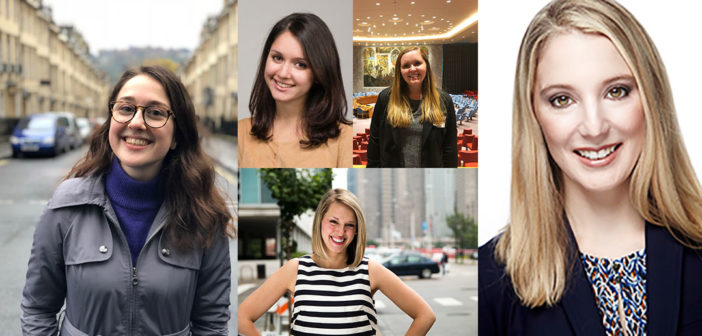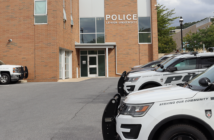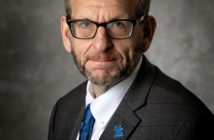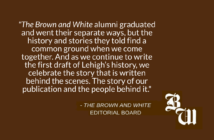The Brown and White has had many editors in chief over the years who have gone onto all kinds of careers. The Brown and White spoke to former EICs Gwen Purdom, ’09, Julie Stewart,’10, Danielle DiStefano,’16, Samantha Tomaszewski,’17, Emily Ward,’18, and Klaudia Jazwinska,’18, to find out how The Brown and White has affected their lives and careers in honor of the 125th anniversary of The Brown and White.
Q: What were some of your best memories on The Brown and White?
Gwen Purdom: Being tapped into all sorts of things going on all around campus that I wouldn’t have necessarily known about otherwise was certainly very memorable. Also putting together the paper was always really fun and I’m still friends with people I worked on it with to this day.
Julie Stewart: I met a lot of people through working on The Brown and White, many of whom I am still friends with to this day. There are lots of memories and those memories have continued and we’ve made new ones. We’ve gone to each other’s weddings and other things of that nature in the years following.
Danielle DiStefano: One of the best parts of being on The Brown and White was developing relationships within the newsroom, the Lehigh community and the Bethlehem community. A lot of the things I was working on for the paper required me to go out into the surrounding community, which I probably wouldn’t have done if I weren’t involved with the paper.
Samantha Tomaszewkski: I loved the fact that we all worked together toward a common goal, getting the paper out every single week. But at the same time, we were all really good friends.
Emily Ward: There have been times when I’ve written very controversial articles, and I couldn’t walk on campus without getting stares or having people come up to me to talk about the article. There were definitely times when I felt like the most hated person at Lehigh because of the articles I wrote, but I think that’s a testament to the work that the writers and editors of The Brown and White are doing. I think that if people are talking about the article, then you’re doing something right in some way.
Klaudia Jazwinska: I learned a lot about what it means to report for a community. The moments that we got to see the real-life impact that our stories had were some of the moments where I felt the most pride in the work that we did.
Q: What were some of your best accomplishments and biggest obstacles as EIC?
GP: Putting out a paper every week was always a good feeling of accomplishment. It taught me a lot of leadership skills and time management skills that I still use to this day.
JS: One thing that I am very proud of is that our team worked on a special issue for the Lehigh-Lafayette game. We came in an extra day the weekend before Le-Laf week and started to put together extra stories. We went into the archives for pictures and stuff and really tried to make the issue about the history of the rivalry.
DD: In J275: Writing for the Media II, we had to a feature on an organization from the community. I discovered this organization called Angel 34, which was founded by a girl who was battling cancer herself and eventually passed away after setting up the organization. Its purpose was to help other children and their families who are dealing with a cancer diagnosis and providing them support and funding to make the experience a bit better for them. I didn’t know how big this story would be when I went to talk to her parents at their home and talk about her and the organization that they are running. It turned into this massive article that took me a really long time and I interviewed a lot of people. It was really emotional in a lot of ways. That was one of those times where I got to go out into the community and really feel like I was doing something good. Ultimately, that story was published in The Brown and White.
ST: One of the biggest things was making sure articles were reported strongly enough to make sure we could publish them without them getting pushed back.
EW: Working on the sexual misconduct story involving James Peterson was definitely a learning experience. It was such a complex issue that it really tested my and the entire newsroom’s abilities as journalists. We had to figure out how to get the story in an ethical way while respecting everybody’s privacy as there was an ongoing investigation.
KJ: I was really proud of the way that we were able to create a new newsletter and get more involved on social media because those were new ways we were able to reach our audience. Because not everyone is inclined to go on the website or to open up the newspaper but if we bring the news to them, that’s still reaching them. In the end, it is our job to inform the public about issues that are relevant to them.
Q: Where are you now and how did The Brown and White help you get there?
GP: I’m still writing and editing, and I am currently the house editor for Houzz. The Brown and White taught me valuable skills that I was able to carry on into my career as a journalist. On recent job interviews, I’ve definitely referenced lessons I’ve learned as editor in chief.
JS: I work as a communications specialist at the University of Delaware and I do freelance writing on the side. I would say that the connections I made at The Brown and White have been pretty important for building my career. I have several friends and former colleagues from The Brown and White that I still talk to.
DD: I work in marketing for a consulting firm. In a marketing role, the real-life skills of interviewing someone and thinking about how data and analytics can inform your strategy are all things I bring over to my career.
ST: I’m an audience editor for The Huffington Post. I had met the person who ended up hiring me at a conference called ONA, Online News Association, that Lehigh had brought me to. I kept in touch with him and he ended up reaching out to me, asking if I was looking for a job. I am definitely grateful to Lehigh for the experience of attending that conference and everything I learned during my time here.
EW: I just finished an internship at the United Nations and I worked in the department of global communications. Something that we were always trying to do during my tenure as editor in chief was exploring national and global issues, while trying to localize them to the Lehigh Valley and to Lehigh’s campus. I think my internship at the UN took this goal one step further. Working at the UN has definitely helped me be more globally conscious and has absolutely made me a better journalist moving forward.
KJ: I’m currently a Marshall Scholar in the UK, and I’m doing my master’s in computational and data journalism. It’s hard to say where exactly I’ll end up, but I always want to hold truth to power, and that’s what I see my future vocation being. Being on The Brown and White really helped me learn a lot. In some ways, I learned more working on the paper than I did in the classroom because journalism is not something that can be taught from a textbook. It’s making those ethical decisions, thinking about what information to include and how to best ask a question. After making some of those complex decisions, I realized those are the kind of decisions I want to be making in life, the kind of work I want to be doing.
Q: What was a memorable moment for you as an EIC?
GP: Probably introducing myself to the rest of the staff in Coppee Hall and knowing that I would be working with these younger students who would be following the same path I had.
JS: I think it was when the majority of the editors were willing to come in on a Saturday when we weren’t typically working on the paper. It wasn’t like I, as the editor in chief, was just telling people to come in. It was a team effort where everyone wanted to make an extra special edition.
DD: I got to deliver the paper for a while and that was a memorable thing. To be the person that is in charge of seeing the paper to fruition twice a week and 24/7 on days that are not print nights, and to also deliver the paper and see the community was really interesting for me.
ST: I was the fall editor in chief so I got to do the Le-Laf issue. It was super exciting because back then it was one of the only issues that we used color for. For us, it was super exciting to do a really nice spread, and we had great designers working for us at the time who made beautiful inserts and stuff like that.
EW: We have a tradition of the other editors making scrapbooks for all the editors in chief. I think one of my favorite memories was getting that because it summed up my four years on the paper and it’s just such a good representation of all the friendships I made on The Brown and White.
KJ: The first article I had written as editor in chief was finally announcing that James Peterson was the professor who had been accused of sexual misconduct fall of 2017. That had been a story that I and other top editors had been sitting on for several months. We knew his name since November and spoke to a lot of sources off the record. And we couldn’t publish any of the information for ethical reasons. So when the university finally confirmed that it was him, we were able to share part of what we had learned.
Q: What do you want the Lehigh community to know about The Brown and White?
GP: It’s important not to underestimate the paper. The kids working on The Brown and White are doing good work and it plays an important role on campus, to tell the stories, keep people informed and connect the community.
JS: The Brown and White is important for several different reasons. For the students who produce it, it’s a wonderful learning opportunity. But for the community, it’s a way to preserve a part of the institution’s history. It’s important for students to be involved with writing the tale of Lehigh.
DD: Reporters are people. They are your peers, they are your friends, they are your students.
ST: The Brown and White is not out to get you, it is a group of student journalists trying to learn and to do their job.
EW: What people don’t stop to consider is that we’re also students, we’re not professionals and we’re just trying to navigate the world of journalism just like our peers trying to navigate their respective disciplines. The difference is that we put our trials and errors on display for the entire school, but I think that’s something that should be celebrated and not discouraged.
KJ: It’s important to reinforce that this is not just a hobby or an activity that students do twice a week simply because of their aspirations to be journalists. They are also telling stories that have value for the Lehigh and Bethlehem communities.
Q: Do you still read The Brown and White?
GP: I still follow the account on Twitter and still read articles occasionally.
JS: I certainly don’t read it as much as I used to, but I do check it out occasionally.
DD: I do! I follow The Brown and White on Facebook and I read the articles all the time.
ST: Yeah I do! I still follow the Facebook page and the Twitter account.
EW: I read the articles that I see on Facebook a lot.
KJ: Yeah I do! I’m still subscribed to the newsletter and I follow it on social media.






Comment policy
Comments posted to The Brown and White website are reviewed by a moderator before being approved. Incendiary speech or harassing language, including comments targeted at individuals, may be deemed unacceptable and not published. Spam and other soliciting will also be declined.
The Brown and White also reserves the right to not publish entirely anonymous comments.
1 Comment
I really enjoyed hearing insights from these fine editors.
And then a few questions struck me after looking at their pictures.
Is the B&W a safe place for males to participate and achieve?
I notice no male editors-in-chief. Is there a male glass ceiling here?
I hope there are adequate outreach and support for males in the LU body. I would be especially delighted to see a non-cis male of color as an editor-in -chief. Maybe the answer s to have co- editor-in-chief in the future to assure one of each sex and at least one be of color and at least one be first generation in college as well.
The school needs to reach out more instead of making these important LU institutions so all white rich single sex. Please do more Lehigh. I am sure you can do better.